Guilt, a story like ‘quicksand’: BBC’s black comic thriller
Black comic thriller Guilt is a story like quicksand — the more our protagonists struggle, the worse it gets.

‘Fictional guilt is as tenacious as Dante’s demons, as indelible as Duncan’s blood,” wrote novelist Annemarie Neary, citing books as diverse as Dante’s Inferno, Dostoevsky’s Crime and Punishment and Toni Morrison’s Beloved.
“It manifests itself in spectres and tormented dreams, driving the afflicted to seek its erasure via the confessional, the bottle or the noose.” Certainly, the culpability for some kind of criminal intrusion into the orderliness of society is a major concern of writers, readers and viewers of crime fiction.
Critic and novelist Julian Symons even argued famously that readers use crime fiction to exorcise their own guilt through ritual and symbolic sacrifice of the murderer who is a “permanent scapegoat”. But sometimes guilt and innocence are problematic in crime fiction.
Where usually the genre’s form of wish fulfilment ensures a solution where the guilty is properly punished, there are those mysteries that distinguish the crime thriller from the detective story, which invert the reader’s or viewer’s expectation and manoeuvre us into a kind of complicity. We are just not sure who to barrack for in these crime thrillers, and sometimes the killers might just be the characters with who we most identify.
And this is certainly the case with this new BBC series, Guilt, which is really about the intractable nature of that intense personal recrimination over wrongdoing, the skirmish to hide culpability on the behalf of a couple of accidental killers, and the way they attempt to somehow overcome the pangs of conscience, of responsibility. And finally to atone. Expiation, it seems, proves difficult to achieve but the journey towards it provides witty Hitchcockian twists and some lovely mordant one-liners – best is “Ever tried to wank to Grand Designs?” – wrapped up in a witty noirish package under young Scottish director Robert McKillop.
The four-part series was created and written by Neil Forsyth, and is an Expectation and Happy Tramp North Production for new digital channel BBC Scotland and BBC Two. It was a show carrying much expectation for the recently established BBC Scotland, only seven months into its life when Edinburgh-set Guilt, written by a Scot and starring terrific Scottish actors, went to air last year and, according to critics, a new outlet with a somewhat precarious hold on the nation’s affections.
RELATED: Blundell reviews Leavenworth | David Stratton reveals his top picks on Netflix
Well, UK critics loved it and Guilt, given a staggered release first on the BBC Scotland channel and then a week later on BBC2, nationally gained “a rolling wave of enthusiasm” from viewers according to the Guardian, Line of Duty creator Jed Mercurio one of many to applaud on Twitter.
Forsyth, a former journalist, is best known, certainly in the UK, for his most famous creation, Bob Servant, from TV series Bob Servant independent, played by Succession’s Brian Cox, based on several books, and a radio series that developed into the TV comedy. But he also wrote the fine TV drama, Eric, Ernie and Me, the story of Eddie Braben, the writer behind the enormous success of Morecambe and Wise, the wonderful stage comics who took their double act to TV, though they never stopped genuflecting to the folklore of variety.
Guilt also features another chalk-and-cheese duo whose fates are conclusively intertwined.
It’s the story of two very different brothers, Max and Jake, played by in-demand Mark Bonnar (Shetland) and Jamie Sives (Game of Thrones), who as siblings have spent as little time together as they possibly can as their lives have evolved.
Unhappily, they find themselves uncomfortably driving home together late at night from a wedding. They are arguing, as they always do, this time about tuxedos and the nature of Ponzi schemes, Max still furious the wedding had a cash bar. One is a little drunk; the other, who is driving, has had a fair amount of illicit substances at the wedding, and suddenly they hit someone, a body flying over the bonnet of the car.

They immediately panic; Jake the driver is uninsured and Max, who is a big-shot lawyer it turns out, starts running through the possible charges they face. They move the body into the darkness and after taking his wallet they find they are in fact outside his house. The victim is on older man named Walter Wood and somehow they contrive to manoeuvre his body into the empty house, where they discover a letter that informs them he’s an outpatient in some kind of palliative care. “He was dying, slowly,” says Max, cynical and domineering. “We just made it quick.”
His brother, a scruffy former musician who now runs a flea-bitten record shop, is anxious though, fearful of the consequences, already overcome by guilt. They prop Walter up in his TV-watching armchair, Max certain, given the state of the body, that natural causes will be determined by the cops. “We gave him a dignified exit, now someone finds him and there’s not a dry eye in the house,” he tells his distraught brother.
Which proves to be the case – problem is Jake, anxious to be gone, has left his wallet behind, yet another grievous example of what his brother calls his “signature f..kwittery”. And the mistakes, luckless cover-ups, and comical misadventures begin to spiral out of control as their moral transgression begins to entrap them after they return to the house for the wallet, interrupting a wake for Walter, and Max encounters his niece from America there to tie up his affairs. She’s Angie, played drolly by Ruth Bradley, and she and the aimless Max fall into an affair, complicated as she quickly twigs her uncle’s death may not in fact have been from natural causes at all.
The performances are splendidly pitched, played with the intensity this kind of show demands, never acknowledging the humour, the two leads especially good.
It’s clear right from the start that we have been pitched into black comic thriller territory where the problem of guilt, the anxiety and ambiguity it creates, won’t be solved by any rational solution. “I wanted the brothers’ story to feel like quicksand,” Forsyth says on the BBC Media Centre website. “The more they struggle, the worse it gets.”
This is a story in which the irrational and the anxious are obviously going to build up to some kind of crisis point. Maybe to several, given the pace at which the drama is played, and the way in which we as viewers are from the start seduced into imaginatively participating and concurring in a murder. And somewhat uncomfortably uncertain of what you feel about these hapless killers, and with whom you sympathise.
What is so clever about Forsyth’s approach is that he throws us into the problem of guilt, its suddenness and shockingness, right at the start before the titles sequence. As he says, pulling “the rug out from the viewer the way it gets pulled out from the brothers”. He started with the idea of brothers squabbling and then the murder, but at that point had no idea where the narrative would take him. “I didn’t know where it was going to go and I was almost trying to write my way out of the problem in the same way the brothers were trying to get out the problem, so I really enjoyed it.”
Guilt is enjoyable to watch too; clever, stylish and engrossing. Forsyth is a writer who doesn’t like to mess around. His obvious delight in the darker side of Scottish humour, often called “miserabilist”, gives it a tang unlike anything we’ve seen recently. (“We are at our best when we value rectitude and reticence and reject jocundity,” said Scottish writer Kevin McKenna.) Forsyth often cites in interviews the influence of the recent US series Fargo, with its distinctive mix of compelling drama and black comedy, a little absurdity mixed with often comedic violence.
“I find it hard to watch dramas where no one says anything remotely funny for six hours of television,” Forsyth says. “It’s so artificial. Humour is one of the major ways that human beings react to extreme pressure, it should always be woven into drama and I think that’s what all the best dramas have done, from The Sopranos to Breaking Bad to The West Wing.”
Guilt may not be in that particular pantheon but it’s one of the cleverest shows to come from Scotland for some time.
Guilt, Thursday, BBC First, 8.30pm.


To join the conversation, please log in. Don't have an account? Register
Join the conversation, you are commenting as Logout